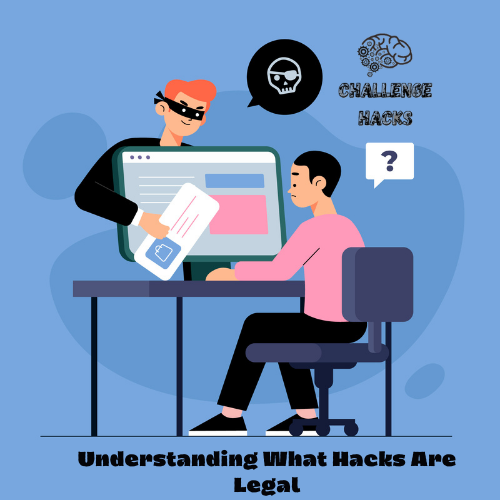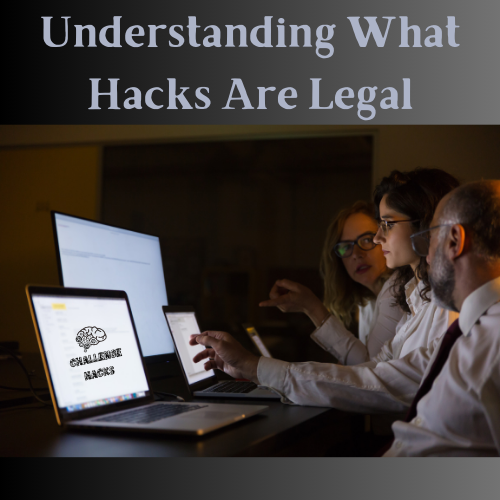
The word “hacking” is frequently associated with bad things like identity theft, data breaches, and cyberattacks. But not every hacking is harmful or prohibited. Actually, some hackers use their expertise to assist businesses in strengthening their security and safeguarding their data from online attacks. These hackers, sometimes known as ethical hackers, carry out hacking operations with the target system or network owner’s consent. Penetration testing, security testing, and white hat hacking are other terms for ethical hacking.
However, how can one Understanding What Hacks Are Legal? How can one become a law-abiding, moral hacker? What are ethical hacking’s advantages and disadvantages? We’ll address all of these queries in this post and provide you with ten methods to know what constitutes a legal hack.
Step 1: Learn the Basics of Hacking
You must become familiar with the fundamentals of hacking before you can begin hacking lawfully. The act of hacking involves taking advantage of security holes in a system, network, or application to obtain unauthorized access or carry out unauthorized tasks. Utilizing a variety of abilities and knowledge, including programming, networking, cryptography, reverse engineering, social engineering, and more, is what hacking entails.
To grasp the essentials of hacking, explore online courses, read books, follow blogs, watch videos, engage in forums, and take part in hacking challenges. Popular resources include a mix of structured learning, community engagement, and hands-on competitions, providing a dynamic approach to acquiring hacking skills.
- Udemy: Unleash your skills with courses like “Ethical Hacking for Beginners” on this versatile online learning platform.
- Coursera: Navigate the world of hacking through courses such as “Introduction to Network Security Devices” and certifications like IBM Network Security Professional.
- EC-Council: Elevate your expertise with certifications like “Certified Ethical Hacker (CEH)” and “Certified Network Defender (CND)” from this leading organization.
- HackThisSite: Hone your abilities with practical challenges and puzzles catering to both novice and expert hackers.
- Hack The Box: Test your mettle on this platform offering diverse challenges and labs, providing a dynamic space to refine your hacking prowess.
Step 2: Understand the Types and Motives of Hackers
In the diverse realm of hacking, not all hackers are cut from the same cloth. Motivations, ethics, techniques, and objectives paint a varied landscape, giving rise to several distinctive categories of hackers. (Understanding What Hacks Are Legal)
- Black hat hackers: Black hat hackers are the ones who hack for malicious purposes, such as stealing data, money, or identities, disrupting systems or services, or causing damage or harm. They do not have any permission or authorization to hack, and they often violate laws and ethical standards. They are also known as crackers, cybercriminals, or bad hackers.
- White hat hackers: White hat hackers are the ones who hack for ethical purposes, such as improving security, testing systems or networks, or finding and fixing vulnerabilities. They have the permission and authorization to hack, and they follow laws and ethical standards. They are also known as ethical hackers, security testers, or good hackers.
- Grey hat hackers: Grey hat hackers are the ones who hack for ambiguous purposes, such as exposing flaws, demonstrating skills, or making a statement. They may or may not have the permission or authorization to hack, and they may or may not follow laws and ethical standards. They are also known as hacktivists, vigilantes, or rogue hackers.
Step 3: Know the Laws and Regulations Related to Hacking
Engaging in hacking is not a lawless pursuit; it comes with a set of regulations and legal boundaries that demand attention. Understanding these laws is crucial before delving into hacking activities. Notable regulations include: (Understanding What Hacks Are Legal)
- Computer Fraud and Abuse Act (CFAA): U.S. federal law prohibiting unauthorized access, imposing penalties from fines to imprisonment.
- General Data Protection Regulation (GDPR): EU regulation safeguarding personal data, enforcing transparency, and security, and imposing penalties for violations.
- Cybersecurity Act (CSA): Singaporean law regulating cybersecurity activities, encompassing penalties from fines to imprisonment. Understanding these legal frameworks is essential for responsible and lawful engagement in hacking activities.
Step 4: Get Permission and Authorization to Hack
To hack lawfully, obtaining permission and authorization is one of the most crucial procedures. Any system or network cannot be hacked without the owner or operator’s permission. It’s also necessary to specify the goals, parameters, and guidelines for your hacking endeavors. You must indicate which networks or systems you are permitted to hack, what tools or methods you are permitted to employ, what data or information you are permitted to access or gather, and what suggestions or actions you are expected to make or carry out.
You must sign a contract or agreement with the owner or operator of the system or network in order to obtain permission and license to hack. There are other names for this contract or agreement, including a statement of work, a penetration testing agreement, and a security testing agreement. The following components must be present:
- The identities and contact information of both the system or network owner/operator and the ethical hacker are listed as parties engaged.
- The goal of the hacking activities, as well as the systems and networks that fall inside and outside of the scope of the activity, are the purpose and scope of the hacking.
- The approach and methods: Which tools and methods are prohibited or restricted, and which ones will be employed by the ethical hacker?
- The tasks and results that the ethical hacker will produce, as well as the timing and plan of the hacking operations, are the deliverables and timeline.
- Secrecy and Liability: The clauses that safeguard the security and privacy of the pertinent data and information, as well as the obligations and liabilities of the parties in the event of any problems or events.
Step 5: Follow the Ethical Hacking Principles and Code of Conduct
Adhering to the ethical hacking code of behavior and principles is another crucial step in hacking lawfully. The actions and conduct of ethical hackers are governed by these rules and guidelines. They contribute to ensuring that ethical hackers behave honorably, sensibly, and morally. Several ethical hacking guidelines and standards of behavior include. (Understanding What Hacks Are Legal)
Honor the rights and privacy of users, consumers, and system owners. Refrain from harming or damaging information, data, or networks. Access only allowed and pertinent data. (Understanding What Hacks Are Legal) Don’t use or distribute unauthorized tools. Never take advantage of vulnerabilities without the owner’s permission. Respect morality by abstaining from immoral or malevolent actions that break the law or other restrictions.
Step 6: Choose the Right Tools and Techniques for Ethical Hacking
Selecting the appropriate tools and ethical hacking methods is also necessary for lawful hacking. These are the tools—hardware and software—as well as the techniques and approaches employed by ethical hackers in their hacking endeavors. They aid in facilitating and enhancing ethical hacking’s efficacy and efficiency. Among the instruments and methods used in ethical hacking are: (Understanding What Hacks Are Legal)
- Reconnaissance Tools and Techniques: Ethical hackers utilize tools like Nmap, Wireshark, Metasploit, Shodan, and Google hacking to gather system or network details, including IP addresses, domain names, ports, services, and vulnerabilities.
- Scanning Tools and Techniques: To pinpoint vulnerabilities, ethical hackers deploy tools like Nessus, OpenVAS, Burp Suite, SQLmap, and Nikto. These tools scan for misconfigurations, bugs, or flaws that could lead to unauthorized access.
- Exploitation Tools and Techniques: Once vulnerabilities are identified, ethical hackers leverage tools such as Metasploit, Netcat, Hydra, John the Ripper, and Mimikatz to exploit weaknesses, gaining access or executing actions on the system or network.
- Post-Exploitation Tools and Techniques: To maintain access and navigate post-exploitation scenarios, ethical hackers employ tools like PowerShell, Psexec, Empire, Cobalt Strike, and BloodHound. These aid in tasks such as privilege escalation, lateral movement, and data exfiltration.
Step 7: Conduct a Comprehensive Security Assessment
At the core of ethical hacking lies the primary objective: conducting a thorough security assessment of the system or network. This involves a methodical and structured approach, encompassing the following key steps: (Understanding What HAcks Are Legal)
- Planning: This is the step where ethical hackers define the scope, objectives, and rules of engagement for the hacking activities, and obtain the permission and authorization to hack.
- Reconnaissance: This is the step where ethical hackers gather information about the system or network and identify the potential vulnerabilities and weaknesses that could be exploited.
- Scanning: This is the step where ethical hackers scan the system or network for vulnerabilities and verify and validate the vulnerabilities and weaknesses that were identified in the reconnaissance step.
- Exploitation: This is the step where ethical hackers exploit the vulnerabilities and weaknesses of the system or network, and gain access or perform actions on the system or network.
- Post-exploitation: This is the step where ethical hackers maintain access, escalate privileges, move laterally, or exfiltrate data from the system or network, and assess the impact and severity of the exploitation.
- Analysis: This is the step where ethical hackers analyze the data and information collected during the hacking activities and evaluate the security posture and level of the system or network.
Step 8: Report and Document Your Findings and Recommendations
After conducting a comprehensive security assessment, ethical hackers need to report and document their findings and recommendations. This is a crucial step that helps to communicate the results and outcomes of the hacking activities to the system or network owner or operator and provide them with actionable and practical solutions to improve their security and protect their data. A report and document should include the following elements: (Understanding What Hacks Are Legal)
- Executive Summary: A concise overview encapsulating main findings, recommendations, and benefits for the system or network owner.
- Introduction: A detailed introduction covering the purpose, scope, methodology, techniques, and timeline of the hacking activities.
- Findings: A comprehensive presentation of identified vulnerabilities, exploited weaknesses, gained access and performed actions, and assessed impact and severity.
- Recommendations: A clear proposal outlining countermeasures, best practices, recommended resources, and tools, along with priorities and timelines for implementation.
- Conclusion: A succinct summary highlighting the main findings, recommendations, and key benefits for the system or network owner.
Step 9: Stay Updated and Educated on the Latest Trends and Threats
Hacking ethically is a continuous process. Ethical hackers must keep themselves informed on the most recent developments and risks in the field of cybersecurity since it’s a dynamic and ongoing activity. Ethical hackers must constantly learn new things, expand their knowledge bases, and modify and advance their methods and tools. (Understanding What Hacks Are Legal)
It is imperative for ethical hackers to be up to date on the latest news and advancements in the cybersecurity space, including fresh attacks and breaches, new technology and solutions, and vulnerabilities and exploits. In addition, ethical hackers should network and work together with other ethical hackers and cybersecurity experts. Some ways to do this include joining online groups and forums, going to conferences and events, and taking part in hacking competitions and challenges. (Understanding What Hacks Are Legal)
Step 10: Pursue a Career or Certification in Ethical Hacking
Hacking ethically is more than just a pastime or a passion. Ethical hackers can also pursue and obtain this certification or job. A gratifying and satisfying career in ethical hacking, or earning an ethical hacking certification, provides ethical hackers with several advantages and prospects, including: (Understanding What Hacks Are Legal)
- Career Opportunities: Ethical hackers can thrive as security analysts, engineers, consultants, auditors, researchers, or instructors in diverse sectors like government, finance, healthcare, education, or technology.
- Career Benefits: The ethical hacking career promises high demand, lucrative salaries, job satisfaction, recognition, and impactful contributions.
- Certification Opportunities: Ethical hackers can bolster their credentials with certifications like Certified Ethical Hacker (CEH), Certified Security Analyst (ECSA), Certified Penetration Tester (CPT), Offensive Security Certified Professional (OSCP), or Certified Information Systems Security Professional (CISSP), validating their skills and enhancing credibility.
- Certification Benefits: Acquiring certifications not only boosts knowledge, confidence, and competence but also increases employability and garners respect in the ethical hacking field.

Pros and Cons of Ethical Hacking
Hacking with an ethical bent is neither a flawless nor an ideal activity. It has benefits and challenges, advantages and disadvantages, and pros and negatives. Among the benefits and drawbacks of ethical hacking are: (Understanding What Hacks Are Legal)
- Pros:
- The data of the system or network, as well as its users and clients, are better secured and safeguarded thanks to ethical hacking.
- The risks and threats that malevolent or unlawful hackers pose to the system or network are lessened or prevented with the aid of ethical hacking.
- Ethical hacking aids in adherence to the rules and laws governing the system or network’s cybersecurity issues and activities.
- The credibility and confidence of the owner or operator of the system or network, as well as the users and clients of the system or network, are all improved by ethical hacking.
- Cons:
- Due to the numerous resources and equipment needed, as well as the numerous steps and procedures involved in carrying out hacking operations, ethical hacking can be expensive and time-consuming.
- Since ethical hacking involves permission and authorization and exposes system or network vulnerabilities, it can be dangerous and difficult.
- Because it uses a variety of tools and techniques, as well as a variety of skills and knowledge, ethical hacking may be a complex and challenging endeavor.
- Depending on the goals and techniques of the hackers as well as the rules and laws governing the system or network, ethical hacking can be both morally right and criminal.
Conclusion
Ethical hacking is a process of exploiting vulnerabilities in a system, network, or application to improve security and protect data, with the permission and authorization of the target system or network owner. Ethical hacking is also known as penetration testing, security testing, or white hat hacking. Ethical hacking is not a one-time activity. It is a continuous and dynamic process that requires ethical hackers to follow 10 steps to understanding what hacks are legal.

What type of hackers usually hack just for fun?
What distinguishes unlawful hacking from ethical hacking?
The act of using a system, network, or application’s weaknesses for enhanced security and data protection—while obtaining the owner of the target system or network’s consent—is known as ethical hacking. The act of taking advantage of weaknesses in a system, network, or application to steal money or do harm without the target system or network owner’s consent is known as illegal hacking. (Understanding What Hacks Are Legal)
What are the skills and knowledge required for ethical hacking?
Mastering ethical hacking requires a diverse skill set encompassing networking, programming, cryptography, reverse engineering, and social engineering. Ethical hackers must be linguistic virtuosos, fluent in languages like Python, C, Java, SQL, and more. Their toolkit includes essential tools like Nmap, Metasploit, Burp Suite, SQLmap, and various techniques, forming the foundation of their expertise. (Understanding What Hacks Are Legal)
What are the benefits and challenges of ethical hacking?
Improving security, averting dangers, abiding by the law, building reputation, and more are just a few of the advantages and difficulties of ethical hacking. There are other expenses, dangers, complexity, and challenges associated with ethical hacking, including the need for resources, tools, permission, authorization, skills, knowledge, and more. (Understanding What Hacks Are Legal)
How Can I Understanding What Hacks Are Legal?
You can Understanding What Hacks Are Legal by enrolling in online courses, reading books and blogs, watching videos and podcasts, joining online communities and forums, and participating in hacking challenges and competitions. You can also obtain certifications, such as CEH, ECSA, CPT, OSCP, or CISSP, that validate your skills and knowledge as an ethical hacker. (Understanding What Hacks Are Legal)
How can I pursue a career or certification in ethical hacking?
Embarking on a journey in ethical hacking involves exploring roles like security analyst, engineer, consultant, auditor, researcher, or instructor. Opportunities that demand or cultivate ethical hacking skills can shape your career path. Additionally, certifications like CEH, ECSA, CPT, OSCP, or CISSP serve as valuable validations, showcasing your expertise in the realm of ethical hacking. (Understanding What Hacks Are Legal)
1 thought on “10 Steps to Understanding What Hacks Are Legal”